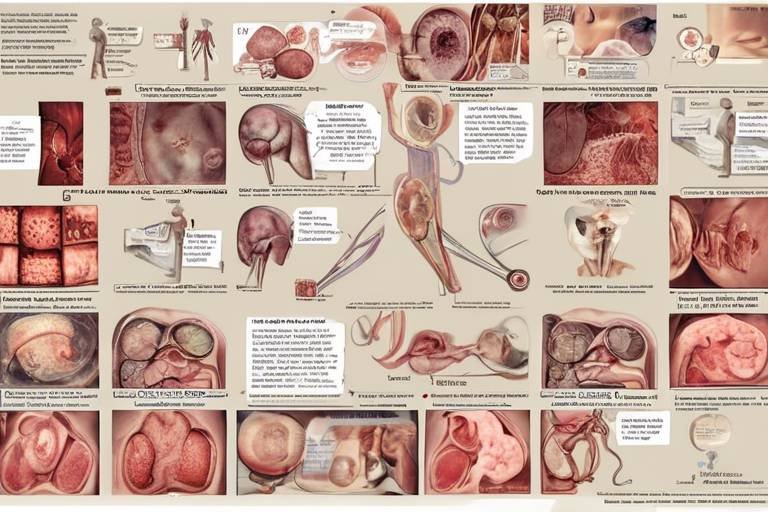The Philosophy of Gut Microbiota and Mental Health Connection
Welcome to a fascinating journey where we explore the intricate relationship between gut microbiota and mental health. Have you ever thought about how the tiny organisms living in your gut could influence your mood, thoughts, and even your overall mental well-being? It may sound surprising, but research is increasingly showing that our gastrointestinal tract is not just a digestive powerhouse; it's also a crucial player in our emotional and cognitive life. This article will delve into the gut-brain axis, the roles of various gut bacteria, the impact of diet, and the promising potential of probiotics in enhancing mental health.
So, what exactly is the gut-brain axis? Imagine a superhighway connecting your gut and brain, allowing for constant communication between the two. This bidirectional pathway means that not only can your brain influence your gut, but your gut can also send signals back to your brain. This connection has profound implications for conditions such as anxiety, depression, and other mental health disorders. The gut microbiota—essentially the trillions of bacteria residing in our intestines—play a vital role in this communication, impacting everything from our mood to our cognitive functions.
But how do these tiny microorganisms manage to hold such power over our minds? The answer lies in their diverse roles. Gut bacteria are not merely passengers; they actively participate in regulating our emotional states. For instance, they produce neurotransmitters, which are the brain's chemical messengers. This is where things get really interesting—certain gut bacteria can produce serotonin and dopamine, two neurotransmitters that significantly influence our mood and feelings of happiness. It's almost like having a little factory of happiness right in your gut!
Let's not forget about inflammation, which is another critical aspect of the gut-brain connection. When our gut microbiota are out of balance, it can lead to inflammation that affects our brain health. This gut-induced inflammation has been linked to various mental health conditions, including depression and anxiety. Think of it this way: if your gut is unhappy, it can send distress signals to your brain, leading to a cascade of negative emotional responses. It's a reminder that our mental health is intricately tied to our physical health, particularly the health of our gut.
As we venture deeper into this topic, we will analyze how our dietary choices can directly affect the composition of our gut microbiota. Imagine your gut as a garden; what you feed it will determine what grows. A balanced diet rich in fiber, fruits, and vegetables can promote a healthy microbiome, while a diet high in processed foods can lead to an imbalance that may negatively impact your mental health. It's all interconnected, and understanding this relationship can empower you to make choices that support both your gut and your mind.
In the following sections, we will explore the potential benefits of probiotics—the friendly bacteria that can help maintain gut health and, in turn, enhance mental well-being. Recent studies are beginning to reveal how these beneficial bacteria can potentially alleviate symptoms of anxiety and depression, making them a promising area for future research.
So, are you ready to dive deeper into the world of gut microbiota and mental health? This journey promises to be enlightening, revealing the profound connections that exist within our bodies and how we can harness this knowledge for better health. Stay tuned as we uncover the mechanisms of interaction, the impact of diet, and the exciting future of research in this burgeoning field.
- What is gut microbiota? Gut microbiota refers to the trillions of microorganisms, including bacteria, viruses, fungi, and other microbes, that live in our digestive tract.
- How does gut health affect mental health? The gut-brain axis allows for communication between the gut and brain, influencing mood, cognition, and emotional well-being.
- Can probiotics improve mental health? Emerging research suggests that probiotics may help alleviate symptoms of anxiety and depression by positively influencing gut health.
- What dietary changes can support gut health? A balanced diet rich in fruits, vegetables, whole grains, and fermented foods can promote a healthy gut microbiome.

The Gut-Brain Axis
The concept of the gut-brain axis is a fascinating one that highlights the intricate and often surprising connection between our gastrointestinal system and our brain. Imagine a two-way street where signals travel back and forth, influencing our emotions, thoughts, and overall mental well-being. This bidirectional communication occurs through various pathways, including the nervous system, the immune system, and even hormonal signals. It’s almost like having a conductor orchestrating a symphony between our gut and brain, where every note played can impact our mood and cognitive function.
At the core of this relationship is the vagus nerve, which serves as a major communication highway. It’s the longest cranial nerve in the body, extending from the brainstem down to the abdomen. This nerve is responsible for transmitting signals that can influence everything from heart rate to digestion and even mood. When our gut is healthy and balanced, it sends positive signals to the brain, promoting feelings of happiness and contentment. Conversely, an unhealthy gut can send distress signals that may lead to feelings of anxiety, depression, or even cognitive decline.
But how does this all work? Well, it turns out that our gut microbiota—those trillions of microorganisms living in our intestines—play a crucial role in this communication process. They produce a variety of metabolites that can affect brain function. For instance, certain gut bacteria can produce neurotransmitters like serotonin, which is often dubbed the "feel-good" hormone. In fact, about 90% of the body's serotonin is produced in the gut, which underscores its importance in regulating mood and emotional health.
Additionally, the gut microbiota can modulate the immune response, which is another key player in the gut-brain axis. When the gut is inflamed, it can lead to increased levels of pro-inflammatory cytokines that can affect brain function, potentially leading to conditions such as depression and anxiety. This connection between gut health and mental health is a growing area of research, with scientists exploring how improving gut health can lead to better mental health outcomes.
In summary, the gut-brain axis is a dynamic and complex system that highlights the importance of our gut health in maintaining mental well-being. By understanding this connection, we can take proactive steps to enhance our gut health, which in turn may lead to improved emotional and cognitive outcomes. Isn’t it amazing to think that a healthy gut might just be the key to a happier mind?

The Role of Microbiota
The human gut is home to trillions of microorganisms, collectively known as the gut microbiota. These tiny inhabitants play a crucial role in regulating not just our physical health, but also our mental well-being. Imagine your gut as a bustling city, where each microbe has its own job, contributing to the overall harmony and functionality of the system. When this city is thriving, we feel good; when it's in chaos, our mental state can suffer.
Research has shown that gut microbiota influence our mood, anxiety levels, and cognitive functions in several fascinating ways. For instance, certain gut bacteria are known to produce neurotransmitters, which are chemicals that transmit signals in the brain. These neurotransmitters, such as serotonin and dopamine, are vital for regulating our emotions and can significantly impact our mental health. In fact, about 90% of the body's serotonin is produced in the gut! This underscores the profound connection between our digestive system and our emotional state.
Moreover, the gut microbiota also plays a role in the immune system. A healthy gut flora helps to maintain a balanced immune response, which is essential for preventing inflammation. Inflammation is a double-edged sword; while it is a natural response to injury or infection, chronic inflammation can lead to various health issues, including mental health disorders like depression and anxiety. Therefore, maintaining a diverse and balanced gut microbiome is not just about physical health—it's also about protecting our mental health.
To illustrate the importance of gut microbiota in mental health, consider the following table that summarizes some of the key functions of different types of gut bacteria:
| Type of Bacteria | Function | Mental Health Impact |
|---|---|---|
| Lactobacillus | Produces lactic acid, which helps maintain gut health. | May reduce symptoms of anxiety and depression. |
| Bifidobacterium | Supports the immune system and intestinal barrier function. | Linked to improved mood and cognitive function. |
| Faecalibacterium | Produces short-chain fatty acids that nourish gut cells. | Associated with lower levels of inflammation and better mental health. |
It's fascinating to think that the food we eat can directly influence the composition of our gut microbiota, and in turn, affect our mental health. A diet rich in fiber, fermented foods, and a variety of fruits and vegetables can promote a healthy microbiome. On the other hand, a diet high in processed foods and sugars can disrupt this balance, leading to negative effects on our mood and cognitive functions.
In essence, the gut microbiota is not just a passive observer in our health; it is an active participant that can shape our emotional landscape. Understanding this relationship can empower us to make informed dietary choices that support our mental health. After all, when our gut is happy, we are more likely to feel happy too!

The relationship between our gut microbiota and mental health is not just a mere anecdote; it’s a fascinating interplay of biological mechanisms that can significantly impact our mood and cognitive functions. Imagine your gut as a bustling city, with trillions of microorganisms living in harmony, constantly communicating with your brain. This communication occurs through various pathways, and understanding these mechanisms can shed light on how our gut influences our mental well-being.
One of the primary ways gut microbiota interact with the brain is through the production of neurotransmitters. These chemical messengers are crucial for transmitting signals in the brain and are integral to regulating our emotions. For instance, certain gut bacteria are known to produce serotonin, often referred to as the "feel-good" neurotransmitter. In fact, about 90% of the body’s serotonin is produced in the gut! This means that a healthy gut microbiome can potentially lead to enhanced mood and emotional stability.
Moreover, the gut microbiota also influence the brain through the modulation of the immune system. The gut is home to a significant portion of our immune cells, which can affect inflammation levels throughout the body. When the gut microbiome is disrupted, it can lead to increased inflammation, which has been linked to various mental health disorders, including depression and anxiety. In essence, an inflamed gut can send distress signals to the brain, creating a feedback loop that exacerbates mental health issues.
Another fascinating mechanism involves the vagus nerve, a critical component of the autonomic nervous system that connects the gut and the brain. It acts as a communication highway, sending signals back and forth. Research has shown that stimulation of the vagus nerve can positively influence mood and anxiety levels, suggesting that our gut health can directly impact our emotional state.
To summarize, the mechanisms through which gut microbiota interact with our brain can be categorized into several key areas:
- Neurotransmitter production: Gut bacteria produce neurotransmitters like serotonin and dopamine.
- Immune modulation: Gut health affects inflammation levels, influencing mental health.
- Vagus nerve communication: The gut-brain connection is facilitated by the vagus nerve.
These interactions highlight the profound impact our gut health has on our mental state. Just as a well-tuned orchestra produces beautiful music, a balanced gut microbiome can lead to a harmonious mental state. Conversely, an imbalanced gut can create discord, leading to mental health challenges. The more we learn about these mechanisms, the better equipped we become to foster our mental well-being through gut health.

Did you know that your gut is often referred to as your "second brain"? This fascinating term highlights the significant role that gut bacteria play in producing neurotransmitters, the chemical messengers that communicate information throughout your brain and body. In fact, a staggering 90% of serotonin, often dubbed the "feel-good" neurotransmitter, is produced in the gut. This connection between our gut health and mental well-being is not just a coincidence; it's a complex interplay that scientists are just beginning to unravel.
To understand this relationship better, let's delve into the types of neurotransmitters influenced by gut bacteria:
- Serotonin: As mentioned, this neurotransmitter is crucial for regulating mood, anxiety, and happiness. Certain gut bacteria, such as Enterococcus and Lactobacillus, are known to enhance serotonin production.
- Dopamine: Often associated with pleasure and reward, dopamine is another neurotransmitter that gut bacteria can influence. For instance, Prevotella species have been linked to increased dopamine levels in the brain.
- Gamma-Aminobutyric Acid (GABA): This neurotransmitter plays a vital role in reducing neuronal excitability throughout the nervous system. Some gut bacteria can produce GABA, contributing to a calming effect on the brain.
But how exactly do these gut bacteria produce neurotransmitters? The process is quite intricate. Gut bacteria ferment dietary fibers, producing short-chain fatty acids (SCFAs) as byproducts. These SCFAs not only nourish the cells of the gut lining but also have the potential to enter the bloodstream and influence brain function. They can modulate the production of neurotransmitters, thereby impacting our mood and cognitive functions.
Moreover, the gut microbiota communicates with the brain through various pathways, including the vagus nerve, which serves as a direct line of communication. This means that the health of our gut can have immediate consequences on our mental state. Imagine your gut as a bustling city, with bacteria acting as the citizens, each playing a role in the overall well-being of the community. If the citizens are healthy and thriving, the city flourishes, leading to a happier and more balanced mental state.
However, it's essential to note that not all gut bacteria are beneficial. An imbalance in gut microbiota, often referred to as dysbiosis, can lead to decreased production of these vital neurotransmitters, potentially resulting in mood disorders such as depression and anxiety. Maintaining a healthy gut microbiome through a balanced diet rich in fiber, fermented foods, and probiotics is crucial for supporting the production of these neurotransmitters and, consequently, our mental health.
In summary, the relationship between neurotransmitters and gut bacteria is a remarkable example of how interconnected our body systems are. By nurturing our gut health, we have the potential to enhance our mental well-being, proving that sometimes, the key to a happier mind lies in the depths of our digestive system.
Q: How can I improve my gut health?
A: Incorporate a diet rich in fiber, probiotics (like yogurt and fermented foods), and prebiotics (found in garlic, onions, and bananas). Staying hydrated and reducing stress can also help.
Q: Can gut health really affect my mood?
A: Absolutely! The gut-brain axis means that a healthy gut can lead to better mood regulation and emotional well-being.
Q: Should I take probiotics for mental health?
A: While some studies suggest that probiotics can help improve mood and reduce anxiety, it's best to consult with a healthcare professional to determine what's right for you.

When we think about mental health, we often focus on the mind, emotions, and psychological factors. However, an intriguing player in this complex game is inflammation. This biological response, typically associated with physical injury or infection, can also have profound effects on our mental well-being. You might be wondering, how does this happen? Well, let’s dive into the fascinating world of inflammation and its connection to mental health.
Research has shown that chronic inflammation can lead to a host of mental health issues, including depression and anxiety. The gut microbiota plays a pivotal role in regulating inflammation levels in the body. When the balance of these microorganisms is disrupted, it can trigger an inflammatory response that reaches the brain. This connection between gut health and mental health is often referred to as the gut-brain connection.
To better understand this relationship, let’s explore some key points:
- Pro-inflammatory cytokines: These are signaling molecules released during inflammation. They can cross the blood-brain barrier and influence brain function, potentially leading to mood disorders.
- Immune system activation: An imbalance in gut bacteria can activate the immune system, causing it to produce more inflammatory markers. This can lead to increased feelings of anxiety and depression.
- Neurotransmitter disruption: Inflammation can interfere with the production and function of neurotransmitters, such as serotonin, which is crucial for mood regulation.
Moreover, studies have indicated that individuals with mental health disorders often exhibit elevated levels of inflammatory markers in their blood. This suggests that inflammation is not just a bystander but a significant player in the development and persistence of these conditions. Imagine your brain as a delicate ecosystem; if one part becomes inflamed, it can disrupt the entire balance, leading to chaos in your emotional landscape.
But what can we do about it? The good news is that lifestyle choices can significantly impact inflammation levels. For instance, a diet rich in anti-inflammatory foods—like fruits, vegetables, whole grains, and omega-3 fatty acids—can help mitigate the inflammatory response. On the other hand, processed foods high in sugar and unhealthy fats can exacerbate inflammation, creating a vicious cycle that affects both gut health and mental well-being.
In summary, understanding the link between inflammation and mental health is crucial for developing effective treatment strategies. By addressing gut health and inflammation, we may pave the way for improved mental health outcomes. So, the next time you think about your emotional well-being, remember that your gut might just be a key player in the game.
Q: Can inflammation really affect my mood?
A: Yes, chronic inflammation has been linked to mood disorders such as depression and anxiety. It can disrupt neurotransmitter function and influence brain activity.
Q: How can I reduce inflammation in my body?
A: Incorporating a diet rich in anti-inflammatory foods, regular exercise, and managing stress can help reduce inflammation levels in the body.
Q: Are there specific foods that help with inflammation?
A: Foods such as fatty fish, nuts, leafy greens, and berries are known for their anti-inflammatory properties and can support overall gut health.

When we think about our mental health, we often focus on emotions, thoughts, and behaviors, but have you ever considered that your diet plays a pivotal role in how you feel? The connection between what we eat and our mental well-being is more profound than many realize. Our gut is home to trillions of microorganisms, and these tiny inhabitants are directly influenced by our dietary choices. In essence, our gut microbiota thrives on the foods we consume, which in turn affects our mood, anxiety levels, and cognitive functions.
Imagine your gut microbiota as a bustling city, where different neighborhoods represent various types of bacteria. Each neighborhood has its own unique vibe, and they all need the right resources to flourish. If you feed them junk food, that city is going to become chaotic, and the inhabitants (your gut bacteria) will not function optimally. On the other hand, a balanced diet rich in fiber, fruits, vegetables, and fermented foods can create a thriving metropolis of gut health, leading to improved mental clarity and emotional stability.
Research shows that specific dietary patterns can significantly influence the composition of gut microbiota. For instance, a diet high in sugar and processed foods has been linked to an imbalance in gut bacteria, often resulting in increased inflammation and a higher risk of developing mental health issues like anxiety and depression. Conversely, diets rich in whole foods—think Mediterranean or plant-based diets—are associated with a healthier gut microbiome and better mental health outcomes.
To give you a clearer picture, here’s a simple breakdown of how different food categories impact our gut health:
| Food Category | Impact on Gut Microbiota | Mental Health Implications |
|---|---|---|
| Fiber-rich Foods (fruits, vegetables, whole grains) | Promotes growth of beneficial bacteria | Improves mood and reduces anxiety |
| Fermented Foods (yogurt, kefir, sauerkraut) | Enhances diversity of gut microbiome | Boosts serotonin production |
| Sugary and Processed Foods | Promotes growth of harmful bacteria | Increases risk of depression and anxiety |
Incorporating a variety of foods into your diet can create a balanced ecosystem in your gut, which is crucial for maintaining mental health. Think of it like nurturing a garden; you wouldn’t just plant one type of flower and expect a vibrant landscape. You need a mix of plants to attract beneficial insects and create a healthy environment. Similarly, a diverse diet helps cultivate a robust gut microbiome.
So, what can you do to optimize your diet for better mental health? Here are a few simple yet effective strategies:
- Prioritize Whole Foods: Aim for a colorful plate filled with fruits and vegetables.
- Include Fermented Foods: Add yogurt, kimchi, or kombucha to your meals.
- Limit Processed Foods: Cut back on sugary snacks and fast food.
- Stay Hydrated: Drink plenty of water to support digestion and gut health.
In conclusion, the impact of diet on gut microbiota and mental health is undeniable. By making conscious food choices, you can foster a healthier gut environment, which may lead to improved emotional well-being and cognitive function. Remember, your gut is not just a digestive organ; it’s a vital player in your overall mental health game!

When it comes to the fascinating world of gut health, probiotics often steal the spotlight—and for good reason! These tiny, beneficial bacteria play a crucial role not just in our digestive health, but also in our mental well-being. Imagine your gut as a bustling city filled with diverse inhabitants, each contributing to the overall harmony of the community. When this community is thriving, it can lead to improved mood and cognitive function.
Research has increasingly shown that probiotics may help to alleviate symptoms of mental health disorders such as anxiety and depression. But how exactly do these microorganisms achieve such remarkable feats? The answer lies in their ability to influence the gut-brain axis, a complex communication network between the gut and the brain. This connection is like a two-way street where signals are sent back and forth, impacting everything from our emotional state to our cognitive abilities.
One of the most exciting aspects of probiotics is their potential to enhance the production of key neurotransmitters. For instance, certain strains of probiotics have been found to increase levels of serotonin, often dubbed the "feel-good" hormone. In fact, did you know that about 90% of serotonin is produced in the gut? This highlights the profound impact that gut health can have on our emotional state. Additionally, probiotics can also modulate the immune system, reducing inflammation, which is increasingly recognized as a contributor to mental health disorders.
To illustrate the benefits of probiotics on mental health, let's take a look at some recent findings:
| Study | Findings |
|---|---|
| Study A | Showed significant reduction in anxiety levels among participants taking a specific probiotic strain. |
| Study B | Found that individuals with depression experienced improved mood after a 12-week probiotic regimen. |
| Study C | Demonstrated enhanced cognitive function in older adults consuming probiotics. |
Incorporating probiotics into your daily routine can be a delicious endeavor! Foods rich in probiotics include yogurt, kefir, sauerkraut, and kombucha. Not only are these foods tasty, but they also help populate your gut with beneficial bacteria, creating a thriving environment that supports both physical and mental health.
However, it’s essential to remember that not all probiotics are created equal. Different strains have different effects, and what works wonders for one person might not have the same impact on another. This is why personalized approaches to probiotic supplementation are gaining traction in both research and clinical practice. A healthcare professional can help guide you in selecting the right probiotic strains tailored to your specific needs.
In conclusion, the relationship between probiotics and mental health is a burgeoning field of study that offers promising insights into how our gut health directly influences our emotional and cognitive states. As we continue to explore this intricate connection, it becomes increasingly clear that nurturing our gut can lead to a happier, more balanced life.
- What are probiotics? Probiotics are live microorganisms that provide health benefits when consumed in adequate amounts, primarily by improving gut health.
- How do probiotics improve mental health? Probiotics can enhance the production of neurotransmitters and modulate the immune system, which may help alleviate symptoms of anxiety and depression.
- Can I get probiotics from food? Yes! Foods like yogurt, kefir, sauerkraut, and kombucha are excellent sources of probiotics.
- Are all probiotics the same? No, different strains of probiotics have different effects, and it's essential to choose the right one for your specific needs.
- How long does it take for probiotics to work? While some people may notice improvements in a few days, it can take several weeks to see significant changes in mental health.

Recent studies have increasingly shed light on the fascinating connection between gut microbiota and mental health. One of the most compelling pieces of evidence comes from clinical trials that have explored the effects of probiotics on mood and anxiety disorders. For instance, a landmark study published in the journal Psychiatry Research found that participants who consumed a specific probiotic strain showed significant reductions in anxiety levels compared to those who received a placebo.
Moreover, a meta-analysis conducted in 2021 reviewed multiple studies and concluded that probiotics could indeed play a role in alleviating symptoms of depression. This analysis highlighted the importance of selecting the right strains, as not all probiotics have the same effects. Here’s a brief overview of some key findings from various studies:
| Study | Probiotic Strain | Outcome |
|---|---|---|
| Psychiatry Research (2016) | Lactobacillus rhamnosus | Reduced anxiety and depression symptoms |
| Journal of Clinical Psychiatry (2021) | Bifidobacterium longum | Improved mood and cognitive function |
| Frontiers in Microbiology (2020) | Saccharomyces boulardii | Decreased stress levels in participants |
These studies not only highlight the potential of probiotics in enhancing mental health but also underscore the complexity of the gut-brain axis. It’s fascinating to think that the tiny bacteria residing in our gut can influence our thoughts, feelings, and overall mental state. This connection is often likened to a two-way street, where not only do our gut health and diet impact our mental well-being, but our emotional state can also affect gut function.
Furthermore, researchers are delving deeper into how specific gut bacteria can produce vital neurotransmitters. For instance, the gut microbiome is known to synthesize around 90% of the body’s serotonin, a neurotransmitter that plays a crucial role in regulating mood. This discovery has led scientists to explore whether enhancing gut health could be a novel approach to treating mood disorders.
As the research continues to evolve, it’s clear that we are just scratching the surface of understanding this intricate relationship. The implications of these findings could lead to new treatment paradigms that incorporate dietary modifications, probiotic supplementation, and personalized approaches based on an individual's unique microbiome composition. The future of mental health treatment may very well lie in the gut!
- What are probiotics? Probiotics are live microorganisms, often referred to as "good" bacteria, that provide health benefits when consumed in adequate amounts.
- How do gut bacteria influence mental health? Gut bacteria can produce neurotransmitters and influence inflammation, both of which play significant roles in mood regulation.
- Can I improve my mental health by changing my diet? Yes, a balanced diet rich in fiber and fermented foods can help maintain a healthy gut microbiome, which may positively affect mental health.
- Are all probiotics the same? No, different strains of probiotics have different effects. It's essential to choose the right strains for specific mental health benefits.

When it comes to enhancing our mental health through the gut microbiota, the path is not only fascinating but also filled with practical steps we can take. Imagine your gut as a bustling city, where billions of bacteria are the citizens working tirelessly to keep everything running smoothly. Just like any city, the health of this microbial community can significantly affect the overall well-being of its inhabitants—us! So, how can we nurture this vibrant community to boost our mental health?
First and foremost, diet plays a pivotal role. Incorporating a variety of foods that promote the growth of beneficial gut bacteria is essential. Think of your plate as a colorful palette of nutrients. Foods rich in fiber, such as fruits, vegetables, whole grains, and legumes, act like fertilizers for your gut microbiota. They help feed the good bacteria, allowing them to thrive and, in turn, positively influence your mood and cognitive functions.
Moreover, fermented foods are like the superheroes of gut health. Foods like yogurt, kefir, sauerkraut, and kimchi are packed with probiotics—live microorganisms that can confer health benefits. Including these in your diet can be as simple as adding a spoonful of yogurt to your breakfast or snacking on some fermented vegetables. These small changes can lead to significant improvements in your gut health and mental well-being.
In addition to dietary changes, mindful eating practices can also enhance the gut-brain connection. Taking the time to savor your meals, rather than rushing through them, allows your body to digest food more effectively and may even improve your mood. Think of it as giving your gut the attention it deserves, creating a harmonious relationship between your mind and body.
It's also important to remember that stress management plays a crucial role in gut health. High levels of stress can disrupt the balance of gut bacteria, leading to a cascade of negative effects on mental health. Incorporating stress-reducing practices such as meditation, yoga, or even a simple walk in nature can help maintain a healthy gut microbiome. Picture your gut as a garden; when weeds (stress) take over, the flowers (good bacteria) struggle to thrive.
Lastly, if you're considering probiotics, it’s best to consult with a healthcare professional. They can guide you in choosing the right strains and dosages that may benefit your specific mental health needs. Just like choosing the right tools for a job, selecting the appropriate probiotics can make a world of difference in your gut health journey.
In summary, by making small yet impactful changes to your diet and lifestyle, you can foster a healthier gut microbiota, which in turn supports your mental health. Remember, your gut is not just a digestive organ; it’s a key player in your emotional well-being. So, treat it well, and it will reward you with a happier, healthier mind!
- What are probiotics and how do they help mental health?
Probiotics are live bacteria found in certain foods and supplements that can improve gut health. They have been shown to influence neurotransmitter production, which can enhance mood and reduce anxiety. - How long does it take to see improvements in mental health after changing diet?
While individual responses vary, many people report feeling improvements within a few weeks of adopting a gut-friendly diet. - Can stress affect my gut health?
Absolutely! Stress can disrupt the balance of bacteria in your gut, leading to digestive issues and negatively impacting your mental health. - Are there specific foods I should avoid for better gut health?
Highly processed foods, excessive sugar, and artificial additives can negatively affect gut bacteria. It's best to limit these for optimal gut health.

The field of gut microbiota and its connection to mental health is evolving at an astonishing pace. As researchers continue to peel back the layers of this intricate relationship, we are beginning to see a clearer picture of how our gut health can influence our emotional and cognitive well-being. One of the most exciting future directions in this research is the potential for personalized therapies. Just as no two people are alike, the composition of gut microbiota varies significantly from person to person. This individuality could lead to tailored treatments that consider a person’s unique microbiome profile, potentially revolutionizing how we approach mental health.
Another promising area of exploration is the role of dietary interventions. As we have seen, what we eat plays a crucial role in shaping our gut microbiota. Future studies may focus on specific dietary patterns or food components that can enhance gut health and, in turn, improve mental health outcomes. For instance, researchers are investigating the effects of fermented foods, fiber-rich diets, and even specific nutrients on the gut-brain axis. The goal is to pinpoint precise dietary recommendations that could serve as preventative measures or adjunct therapies for conditions like anxiety and depression.
Moreover, the integration of technological advancements into microbiome research is set to open new avenues. With the rise of metagenomics and advanced sequencing techniques, scientists can now analyze the gut microbiome with unprecedented detail. This could lead to breakthroughs in understanding how specific bacterial strains interact with our brain and influence mental health. By employing big data analytics, researchers can also examine vast datasets to identify patterns and correlations that were previously undetectable.
As we look to the future, one cannot overlook the importance of clinical trials. While preliminary studies have shown promise, rigorous clinical trials will be essential to establish the efficacy and safety of probiotic and prebiotic interventions. These trials will not only help validate the findings but also provide insights into the optimal dosages and combinations of microbial strains that could yield the best mental health outcomes.
Finally, a holistic approach that considers the interaction of gut microbiota with other biological systems, such as the endocrine and immune systems, will be crucial. Understanding these complex interactions will help us develop comprehensive treatment strategies that address mental health from multiple angles. As we continue to explore the gut-brain connection, the potential for innovative therapies is limitless, paving the way for a future where mental health treatments are as individualized as the people they are designed to help.
- What is gut microbiota? Gut microbiota refers to the diverse community of microorganisms living in our digestive tract, playing a crucial role in our overall health.
- How does gut health affect mental health? Research indicates that gut health can influence brain function through the gut-brain axis, affecting emotions and cognitive processes.
- Can probiotics improve mental health? Some studies suggest that probiotics may help alleviate symptoms of anxiety and depression, but more research is needed to confirm these effects.
- What dietary changes can support gut health? Incorporating fiber-rich foods, fermented products, and a variety of fruits and vegetables can promote a healthy gut microbiome.
- Are there any risks associated with probiotics? While generally considered safe, some individuals may experience side effects, and it’s essential to consult a healthcare professional before starting any new supplement.
Frequently Asked Questions
- What is the gut-brain axis?
The gut-brain axis is like a two-way street between your gut and your brain. It’s a communication network that allows these two crucial systems to influence each other. Think of it as a chatty neighbor who keeps you updated on everything happening next door—what you eat can affect how you feel, and vice versa!
- How does gut microbiota affect mental health?
Gut microbiota, the friendly bacteria living in your intestines, play a significant role in your mental health. They help produce neurotransmitters, like serotonin, which are vital for mood regulation. So, when your gut is happy, it can lead to a happier you! It's like having a team of cheerleaders in your belly, boosting your mood every day.
- Can diet really influence my gut microbiota?
Absolutely! Your diet is the fuel for your gut bacteria. Eating a balanced diet rich in fiber, fruits, and vegetables can promote a diverse gut microbiome, which is essential for good mental health. Imagine your gut as a garden—what you plant (or eat) determines how lush and vibrant it can grow!
- What are probiotics, and how can they help?
Probiotics are live bacteria that can confer health benefits when consumed. They are like the good guys in the superhero movie of your gut health! Research suggests that probiotics can help improve symptoms of anxiety and depression, making them a promising option for enhancing mental well-being.
- Are there any studies linking probiotics to mental health improvements?
Yes, several recent studies have shown a positive connection between probiotic intake and improved mental health outcomes, especially in individuals suffering from anxiety and depression. It’s like discovering a hidden treasure that can help you feel better from the inside out!
- How can I incorporate probiotics into my diet?
Incorporating probiotics into your diet is easier than you might think! You can enjoy foods like yogurt, kefir, sauerkraut, and kombucha. These tasty options not only support your gut health but can also add a zing to your meals. Think of it as adding a splash of color to your plate!
- What future research is being done in this field?
Future research is looking at personalized approaches to treatment based on individual microbiota profiles. This means that rather than a one-size-fits-all solution, scientists are exploring how tailored therapies can optimize gut health and, in turn, improve mental health outcomes. It’s like having a custom-fit outfit that makes you feel fabulous!



















